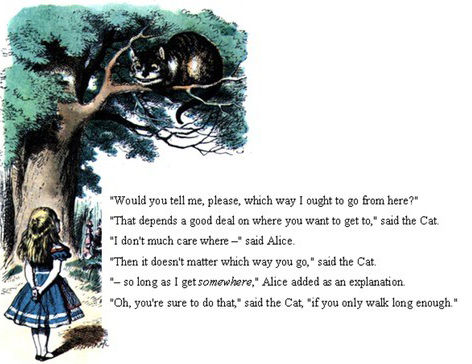“If you don’t know where you are going, any road will take you there”
-to paraphrase Lewis Carrol, from Alice In Wonderland.
It is that time of year once again. As with the beginning of every new year, everywhere you look people and pundits are telling you what you should do to improve the “old you”. “Exercise more.”, “Eat less.”, “Work harder.”, “Focus on quality time.”, “Spend less time on social media.”, “Read a book.”. There is no shortage of externally directed, “self-improvement” advice, most which you heard and failed to heed for any extended period last year. Sure, you made those “New Year’s” resolutions along with most everyone else, but why like most everyone else did they fail to become a habitual practice. Usually the answer is simply there was no immediate ROI (Return on Investment).
In life, just like in business, most people want and expect a return on their investment. If they are going to spend their time and capital on exercise, they want the smaller belt or dress size or the six-pack abs (or at least not feeling like they will faint after slowly walking up a couple of flights of stairs). In fact, they more than just expect that ROI, they feel they are entitled to it. And indeed, in life as in business, this is a reasonable expectation. Other than the few, complete altruists amongst us or those who are part of the 1% club, we cannot afford to expect less if we make an effort. The problem of why we often don’t achieve or ever see that ROI is often more one of timing, than actual lack of effort.
In business, as in our day to day existence, we are faced with an abundance of good ideas, many of which at their initial voicing, seem to illustrate a logical path or a highly rewarding strategy we should follow. The more immediate we stand to reap the benefits, or in other words the shorter the journey to success, the more attractive the suggested path appears. Unfortunately, it is rare we reach our destination quickly or easily. Just as it takes thousands of crunches and “planks” to build the “abs six-pack”, it takes a lot of phone calls, numerous meetings and briefings, and in many cultures a seemingly excessive amount of “tea drinking” to even begin to reach the point of tabling a proposal much less closing a deal. It is for these reasons, before we ever start on our journey a destination must be carefully selected, a path forward must be wisely designated and it must be clearly marked by “waypoints “(tangible activities or results). These “waypoints” will assist us in both marking our way and in realistically defining our timeline and rate of travel so that not only can we readily measure our level of success along the path, but even choose detours and off ramps if necessary.
Our “waypoints” will not only serve to blaze our trail forward and keep us on track, they will also serve to help us manage the expectations of those who are “observing” the journey. Often the advice voiced by those who aren’t slogging down the path can raise speed bumps and even obstacles, because they do not comprehend the trip as intimately as do the journeymen and women. “Waypoints”, or clearly defined and articulated intermediate objectives, will assist us in explaining where we are headed in addition to aiding us in getting there – the point of profit.
Unlike Alice, we must clearly define and mark our path, as it is critical to us getting where we want to go, rather than simply having us arrive “somewhere”.
Now that is a resolution I believe we can all agree to make a habit.

